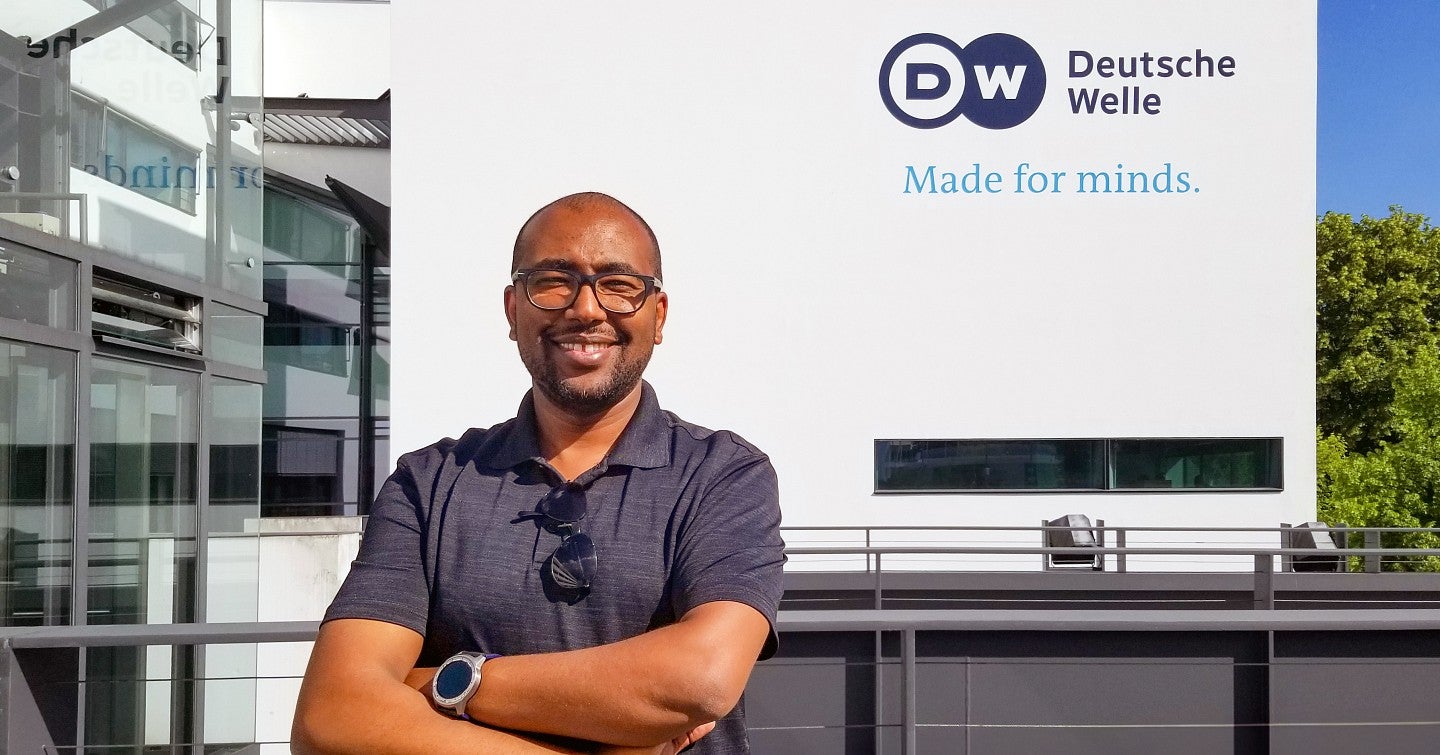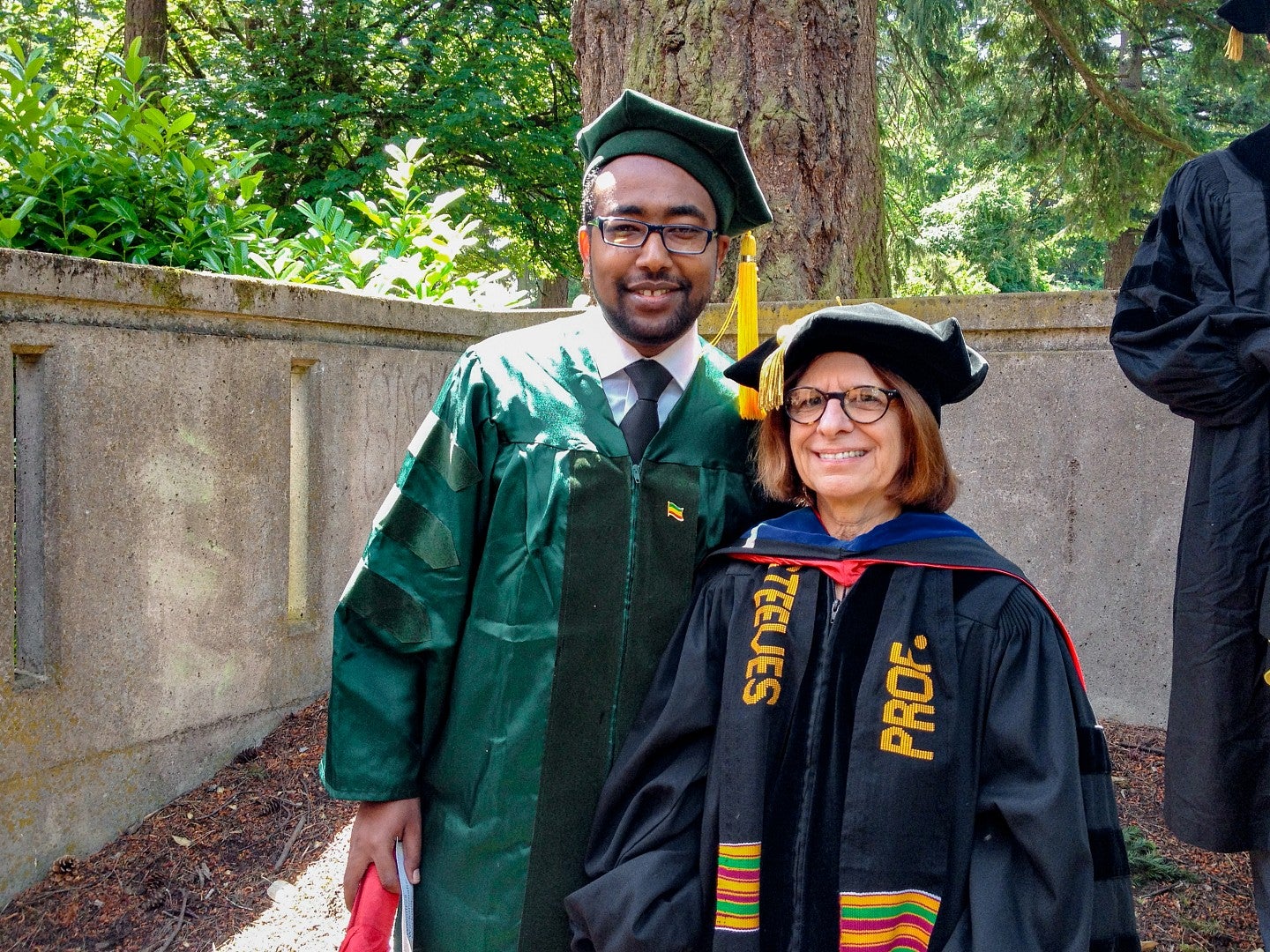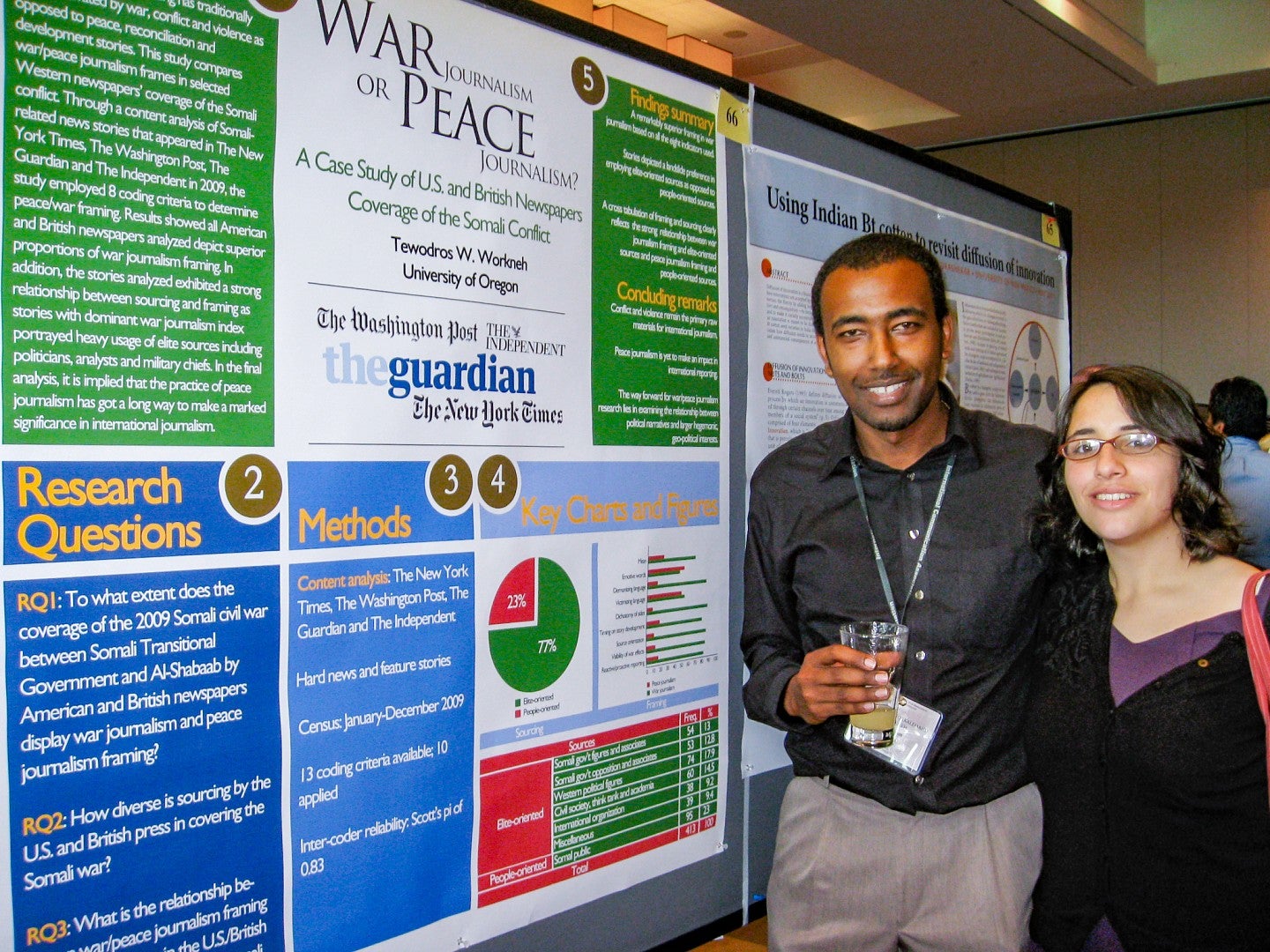
Today Tewodros “Teddy” Workneh ’14 has his dream job as an associate professor of global communication for the School of Communication Studies at Kent State University in Ohio. But it all started when he moved from Ethiopia to Oregon to pursue a doctoral degree in media studies with a concentration in international communication.
Prior to making the move, he had no knowledge of Oregon except for the connection he made with UO School of Journalism and Communication (SOJC) professor Leslie Steeves.
Workneh’s contact with Steeves began during his research for his master’s thesis about how children in Ethiopia relate to the messages of Disney movies. His research led him to Janet Wasko, SOJC professor and Emeritus Knight Chair in Communication Research.
Through his contact with Wasko, Workneh learned about both the SOJC and Steeves, who had extensively traveled in Africa, including in Workneh's native Ethiopia.

From Ethiopia to Oregon
UO was one choice among many during Workneh’s doctoral application process. He recalls applying to schools in Ohio and Canada, but in the end Oregon stood out.
“What I had was a very welcoming message from SOJC, especially Leslie Steeves, who to this day I consider to be a very good friend to me and my family. But it was like a leap of faith for me,” Workneh said.
Workneh grew up in Addis Ababa, Ethiopia, playing soccer and running track. It’s also where he earned his bachelor’s degree in English from Dilla University, and later his master’s degree in journalism and communication at Addis Ababa University.
He was not sure what to expect, but it turned out the lush natural environment in Eugene was similar to Arba Minch, the beautiful small Ethiopian college town where he taught classes for his first job. Workneh recalls being “pleasantly surprised” when he first stepped foot on Eugene soil.
Not much else about Eugene was like Ethiopia, though. He said his first year was about cultural negotiation, learning how to navigate academic differences and making a new country feel like home.
“Fortunately, I had very good friends, colleagues and people who helped me settle very well,” Workneh said.
Honing research skills at the SOJC
From the SOJC, Teddy gained many benefits, including mentors like Leslie Steeves, Gabriela Martínez, Janet Wasko, and many other faculty and graduate students. He also discovered a love for research and his passion, international studies, that blossomed as time went on.
One of the courses that stood out to him during his time at UO was Development Communication for Social Change. He teaches similar content to this day in his own courses.
“It was fundamental for me because it introduced me to a lot of good theories that I consider to be important for my research and literature that are very influential,” Workneh said.
Workneh says he has always been curious about research, but the SOJC gave him the tools to understand it from a systematic point of view and to hone important skills in academia.
“I had a solid foundation in it, but I really didn't have the rigorous approach to research. And in that sense, I think the program made me better. And also, it has made me pause and reflect on my own posture intellectually,” Workneh said. “I always believe that the purpose of good education is change. It needs to bring about change in the way you view yourself and you view your world. And I feel like I got that from my experience.”
Workneh thinks the most valuable thing he got out of the SOJC wasn’t a class, but the connections that go beyond the classroom. For example, he traveled to Ghana with Steeves for the SOJC’s Media in Ghana program, and he and Steeves collaborated for an article about Anthony Bourdain in 2019, “Anthony Bourdain: Parts Unknown in Africa: Cultural Brokerage, ‘Going Native,’ and Colonial Nostalgia.” His experiences combined with his community of colleagues make Eugene a special place for Workneh.
“I know if I come back to Eugene, I will be amongst friends and family,” Workneh said.

The benefits and drawbacks of researching your home country
In winter 2022, Workneh traveled back to Ethiopia for the first time in 10 years for a research project on international public media and how people develop trust in the news outlets they hear every day.
“I wanted to do some interviews in Ethiopia and also in Kenya, and it was also good to see some family and friends,” Workneh said.
Workneh’s work focuses on Ethiopia and the Ethiopian diaspora, broadly examining the concept of global media flow and media distribution within the lens of the country’s political economy and rich cultural history. His research has examined historical and contemporary tenets of state-media relations in Ethiopia and the diaspora from policymaking, legislative and regulatory standpoints. Some of his published research papers include “Ethiopia’s hate speech predicament: Seeking antidotes beyond a legislative response” (2019) and “Social media, protest, & outrage communication in Ethiopia: Toward fractured publics or pluralistic polity?” (2019).
Workneh said he wanted to shine a spotlight on Ethiopia for his research because he has a connection to the country culturally and intellectually.
“It's my home. And I think there is a degree of authenticity, if you will, to engage in research about a place and the people that I know,” Workneh said. “I think research has given me an appreciation to reflect on how complex and diverse our societies are, politically, culturally and socially. And in that sense, I think for me, it has always been about learning and understanding about my country through the craft that I have, which is research.”
Although researching Ethiopia has brought Workneh new understanding and knowledge about where he came from, it can be difficult and heart wrenching to dive into a country’s instability — even more so when that country happens to be home.
“On one hand, yes, you know there is a degree of getting that research done and saying, ‘OK, there are new understandings that I did not have before.’ So that sense of discovery is fulfilling, but at the same time, that discovery becomes personal and at times painful when my scholarship involves such topics as hate speech, extremism and incitement in the media,” Workneh said.
Right now, Workneh is taking a break from studying difficult topics to expand into a new research area. Ever since he was little and lived in Ethiopia, he has had a passion for cooking, bolstered by the support of his grandmother.
“In my culture men aren't supposed to go to the kitchen, but she really was someone who not only never minded me getting into the kitchen, but she encouraged it,” Workneh said. “She would always say, ‘You know whenever Teddy makes something, that's my favorite food, right?’ I knew what I cooked was probably terrible, but she always had nice things to say. She kept me going.”
His current research interests in food, foodways and how different countries’ cultures are represented in the media through culinary adventure programs, are his way of returning to his cultural roots and family ties.
“It’s a very fulfilling and practical way to connect with my childhood,” Workneh said.
The best doctoral preparation is passion, infused with pragmatism
Workneh advises students to go into a doctoral program for the right reasons. In his case, he wishes he researched more about what the program entailed and had more life and work experience behind him before diving straight into it.
“You need to prepare for it mentally, and I always find it helpful for students to have different experiences outside of academia before getting into a Ph.D. program,” he said. “Different people have different paths, and there is no single way that one can be successful getting into a Ph.D. program.”
But in the end, he believes, everything will work out.
“If you really have passion for research and infuse your passion with the right dose of pragmatism and discipline, it will likely turn out well,” Workneh said.
—By Kaia Mikulka, class of '26
Kaia Mikulka is an advertising major, a member of the School of Journalism and Communication direct-admit program, and a member of Clark Honors College. Her passions include marketing and branding, and also their intersection with creativity and law, and she is a designer and illustrator for UO's Ethos Magazine.
